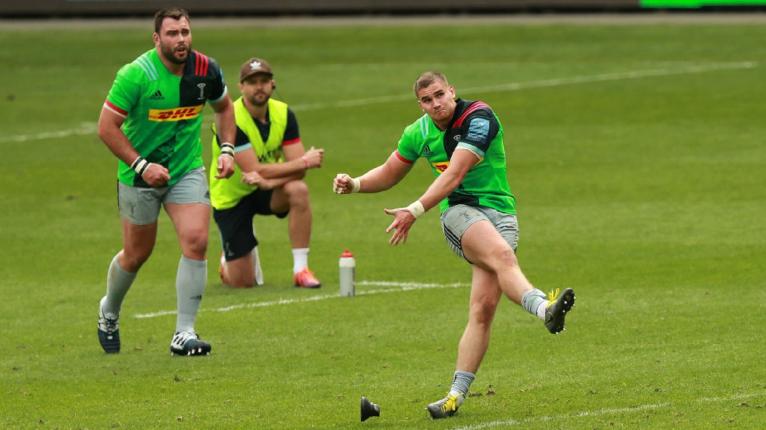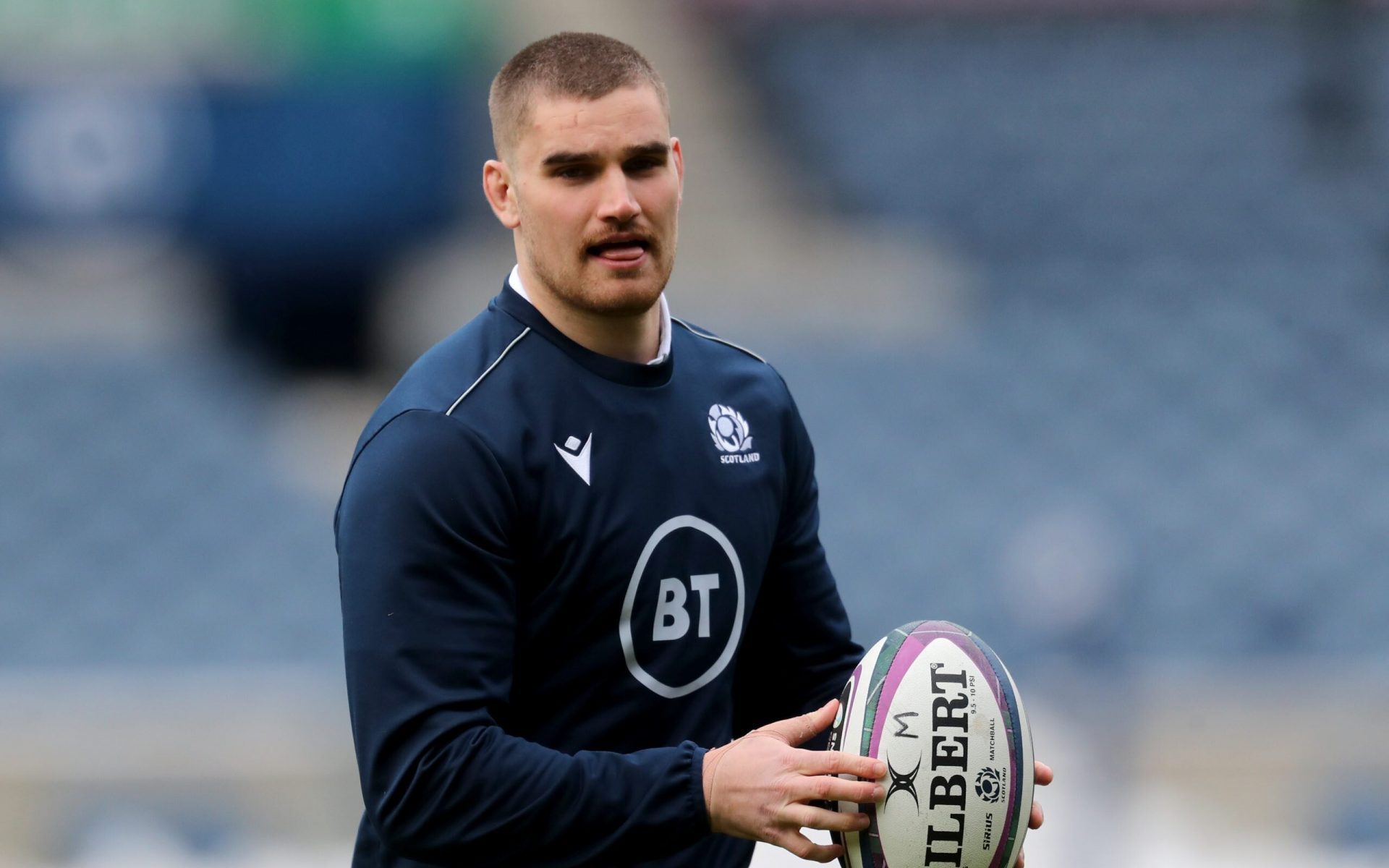'You get your head kicked in by a lot of angry Welshmen, especially having the accent I have'

As lockdown birthdays go, James Lang’s was a howler.
The centre spent the first night of his 27th year chasing shadows around The Stoop, his Harlequins eviscerated by Ulster and sent scudding out of the Challenge Cup. Then it was up the road for a quiet beer with Tom Lawday, his housemate; part birthday celebration, part drowning of sorrows.
“We got pumped,” the Scotland back says, bluntly. “After the game, we had a few drinks and tried to forget about it. You have to move on quickly. Happy birthday to me, right?”
Dry, self-deprecating wit is weaved through Lang’s recollections. He laughs wistfully about his mother, Rena, a former England footballer, because she has stashed her trophies in the family loft and he has none of his own to replace them downstairs, save “a couple of participation medals… you know, the ‘thanks for coming’ ones”.
He spent the first period of coronavirus-enforced confinement furnishing his flat in Surbiton, a short hop up the A3 from The Stoop, where he was flummoxed by a dishwasher.
“I didn’t want to pay the £20 installation fee, which is so cheap of me. I’d say for advice, just pay it. It took me the best part of four hours to put all the panels on. It got done. It’s not perfect. It’s still not level.”
Kitchen appliances are bewitching foes, no doubt, but ask Lang what made him as a player, and he takes you back to his student days, to the boy transplanted from a cushy life of social rugby and more-than-social drinking to the North Walian coast and a league of gnarly brutes.
It was 2014, and RGC, the famous nursery of talent in Colwyn Bay, were looking for a stand-off. Lang is Welsh-qualified through his father, his name appeared on some WRU talent matrix, and up cropped a chance to rekindle his goal of playing professional rugby.
The move forced a ruthless coming of age. The second-tier Welsh Championship is unforgiving, especially for a teenage play-maker who speaks in clipped Surrey tones.
“You get your head kicked in by a lot of angry Welshmen, especially having the accent I have,” Lang chuckles. “They wanted to fill me in. It was my first experience of men’s rugby.
“My first start was against Bargoed at home and notoriously we’d had a lot of issues with them, a lot of fights. The team meeting beforehand was mostly about ‘one in, all in’ and I was there as a 19-year-old thinking, what? I’ve never thrown a punch in my life.

“Early in the game, our captain was tackled off the ball, driven back excessively, and dumped on the floor. He got up, pushed the guy and walked off. The guy came up behind him and just, bang, blind-side, lamped him. Everyone jammed in. I was thinking, what have I got myself into? No touching of the hair or face!
“I had a stinker, threw about three interceptions and we lost. But we played them again later in the season and hadn’t beaten them for a while, and I got a kick to win it at the end.”
This was not some voyage to rugby’s Wild West. The place was brilliant for Lang to learn and blossom. Rupert Moon and Phil Davies, colourful men with vast technical brains, were his coaches. He encountered challenges beyond anything that university rugby could ever throw at him. He had no choice but to address the flaws in his game and learn to cope with the salivating heavies who wanted to rip his head off.
“It taught me a lot, it toughened me and set me up for my career. I definitely wouldn’t be where I am now without going up there; a lot is owed to Rupert Moon, Phil Davies and RGC.
“The physicality was like nothing that I’d ever seen before. We were a younger side with some Wales Under-20s players, so I can imagine other teams’ game plans would have been to bully us physically. You felt that every week.
I’d like to thank @Harlequins for the last 5 years. I’ve had an amazing time and met some great people along the way. Looking forward to the next chapter but excited to Finish the season on a high with a special group of players #coyq pic.twitter.com/i2BbtevLZK
— James Lang (@langers95) January 17, 2021
“We played a different brand to the rest of the league; we were very expansive and liked to play from anywhere. We had a mobile pack, and that was instilled in us and suited us. But when they brought it to us physically it was quite tough. It definitely taught me some things.”
In his second season, Lang helped steer RGC to promotion. Moon and Davies, knowing what talent they had on their hands, touted him to all four Welsh regions. There was a tantalising sit-down with the Scarlets academy staff, promises of loan moves and first-team exposure, then radio silence. No messages, no calls, no contract. It was a chastening blow.
REPORT: Lang hits 30 points as RGC win 80 Nil at Llanharan https://t.co/6JYeOV5Ioo pic.twitter.com/UXmVfcMmhG
— RGCnews? (@RGCNews) March 19, 2016
“I got my clips together from RGC, made a reel and my agent sent it out. I got a message back saying we’d got an offer from Harlequins. I couldn’t really believe it – such a prestigious club, back where I grew up.
“I came down, had a meeting with Tony Diprose, who was the academy boss, and my agent. It was quite funny, John Kingston had just been appointed director of rugby, he was walking outside and Dippy called him in. He sat down and said, ‘so who are you?’ He had no idea who I was.
“My first day there, coming in to the changing room and sitting next to Danny Care, Mike Brown, Chris Robshaw, Jamie Roberts – all these big names that I used to watch when I was younger. Everyone helped me, was really welcoming, and hopefully we can finish on a high and get a title for my last year.”
Five seasons and six Scotland caps after fetching up in that room of giants, Lang will leave Harlequins this summer. Edinburgh is his destination; more rugby his goal.
At times, he has been a victim of his own versatility. Covering fly-half, both centre slots and full-back, coaches have treated him as a Swiss army knife, a utility man best deployed from the bench. He has scarcely nailed down his prized number 12 jersey, and when he has, injury got in the way.

“I have aspirations to play a lot more times for Scotland, and to do that, I need to play more at centre, and I need more game time. We’ve got great strength in depth, but for my development and my career, moving to Edinburgh, the vision Richard Cockerill has and the players he’s got there are really exciting.
“Being closer to the national squad would be better, but it’s more about just getting consistent game time. Only in the last year-and-a-half have I been getting decent, consistent game time. I’ve always just been in and out, in and out.
“A lot of the time it can be seen as a good thing, but also a detriment being able to cover 10, 12, 13 and 15 – the perfect guy to have on the bench. But I don’t want to be that bench guy, I want to be starting because I’ve not actually played a great deal of games starting at centre, in my best position.
“I want that consistency. I feel a need a change. A big part of me wanted to stay at Harlequins and I thought in two years’ time, would I regret staying? The answer was yes. I would regret staying in my comfort zone.”







































